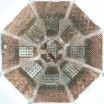(Press-News.org) At first glance, colonies of thousands of social spiders all look the same and are busy with the same tasks. Not so, says researchers Carl Keiser and Devin Jones of the University of Pittsburgh in the US, after carefully studying various gatherings of Stegodyphus dumicola social spiders of the Kalahari Desert in South Africa. The size and condition of a particular spider's body indicates which task it generally performs within a colony. In addition, neighboring colonies can have different "personalities" too, writes Keiser, lead author of a study published in Springer's journal Behavioral Ecology and Sociobiology.
Stegodyphus dumicola spiders live in colonies of up to 2,000 members in thorn trees in the arid parts of southwestern Africa. The spiders build large webs consisting of dense communal living areas and a two-dimensional capture web. To study them, Keiser and his colleagues transported various colonies collected in the southern Kalahari Desert to their laboratory at the University of Pittsburgh. They then carefully watched to what extent individuals were involved in tasks such as attacks, web building or web repairing.
Keiser and his colleagues believe that such studies are vital to understand how the traits and actions of individuals combine to form and develop the social organization and collective behavior of a particular species. In the case of Stegodyphus dumicola, the research group found that body size and body condition influence the chances that an individual spider will perform a range of tasks needed to maintain the colony. Spiders with smaller bodies are more likely to help with web building and maintenance. Those who are in better condition tend not to capture prey, while those with lower body condition are more likely to be busy with foraging.
A colony's "personality" or collective behavior is best predicted by the variety of individual spiders living within it. Colonies with members with different body sizes or aggression levels contain spiders which are slower to emerge from their nest to attack prey. Variation in boldness within colonies is in turn linked with better chances that more individual spiders will take part in standard web building activities.
"The results are intriguing because this trait variation and its resulting task differentiation gives rise to a cooperative breeding society composed of highly related, inbred individuals. The spiders are of nearly identical age and develop together in synchrony," explains Keiser. "Our findings differ from the once conventional reasoning among social spider researchers that social spider societies are homogenous and egalitarian."
INFORMATION:
Reference:
Keiser, C.N. et al (2014). Exploring the effects of individual traits and within-colony variation on task differentiation and collective behavior in a desert social spider, Behavioral Ecology and Sociobiology. DOI 10.1007/s00265-014-1696-9
The full-text article and a photo are available to journalists on request.
Size, personality matter in how Kalahari social spiders perform tasks
Study looks at division of tasks in colonies of southern African social spiders
2014-03-20
ELSE PRESS RELEASES FROM THIS DATE:
Swing voters hold more sway over candidates on economic issues
2014-03-20
CHAMPAIGN, Ill. — New research from two University of Illinois economics professors who study election trends analyzes how polarization on social issues affects competing candidates' economic platforms.
In the paper, co-authors Stefan Krasa and Mattias Polborn develop a theory of candidate competition that accounts for the influence of both economic and cultural issues on individual voting behavior.
"Many pundits and academics have argued that political polarization, particularly on social and cultural issues, has increased in the U.S.," said Polborn, also a professor ...
UTMB researchers discover a way to potentially slow down Alzheimer's
2014-03-20
Researchers at the University of Texas Medical Branch at Galveston have discovered a way to potentially halt the progression of dementia caused by accumulation of a protein known as tau.
Normally, tau protein is involved in microtubule formation, which acts as a brain cell's transportation system for carrying nutrients in and waste out. In the absence of tau protein, brain cells become dysfunctional and eventually die.
In many forms of dementia, such as Alzheimer's disease and chronic traumatic encephalopathy caused by multiple concussions, the tau protein starts behaving ...
What singing fruit flies can tell us about quick decisions
2014-03-20
You wouldn't hear the mating song of the male fruit fly as you reached for the infested bananas in your kitchen. Yet, the neural activity behind the insect's amorous call could help scientists understand how you made the quick decision to pull your hand back from the tiny swarm.
Male fruit flies base the pitch and tempo of their mating song on the movement and behavior of their desired female, Princeton University researchers have discovered. In the animal kingdom, lusty warblers such as birds typically have a mating song with a stereotyped pattern. A fruit fly's song, ...
As age-friendly technologies emerge, experts recommend policy changes
2014-03-20
From smart phones to smart cars, both public and private entities must consider the needs of older adults in order to help them optimize the use of new technologies, according to the latest issue of Public Policy & Aging Report (PP&AR), titled "Aging and Technology: The Promise and the Paradox." A total of eight articles all from authors affiliated with the Massachusetts Institute of Technology AgeLab are featured.
"Remarkable technological advances are all around us, and leaders in the business and scientific communities are keenly aware of 'the aging of America' and ...
A braking system for immune responses
2014-03-20
The surface of immune system cells is home to a number of receptors which are able to detect pathogens. As soon as these receptors are activated, inflammation occurs and the body's defense mechanisms kick in. Immune cells also have receptors that regulate or even suppress immunological responses to prevent damage to individual cells.
There are other immune receptors that recognize endogenous substances that are released when tissue damage or cell death occurs. As such, the organism can defend itself even in cases where the damage caused by the pathogen, but not the pathogen ...
(Not too) few but capable
2014-03-20
Until the '50s, bluefin tuna fishing was a thriving industry in Norway, second only to sardine fishing. Every year, bluefin tuna used to migrate from the eastern Mediterranean up to the Norwegian coasts. Suddenly, however, over no more than 4-5 years, the tuna never went back to Norway. In an attempt to solve this problem, Giancarlo De Luca from SISSA (the International School for Advanced Studies of Trieste) together with an international team of researchers (from the Centre for Theoretical Physics - ICTP – of Trieste and the Technical University of Denmark) started to ...
Inhibition of CDK4 might promote lymphoma development and progression
2014-03-20
COLUMBUS, Ohio – Anticancer agents that inhibit tumor growth by targeting a regulatory protein called CDK4 might actually promote the development and progression of certain B-cell lymphomas, according to a new study led by researchers at The Ohio State University Comprehensive Cancer Center – Arthur G. James Cancer Hospital and Richard J. Solove Research Institute (OSUCCC – James).
The study indicates that inhibiting CDK4, a regulator of the cell cycle, promotes genetic instability and the development or progression of B-cell lymphomas that are driven by the MYC oncogene.
The ...
Thoughtful people more likely to infer improvements in race relations
2014-03-20
According to a recent Pew Research poll, a majority of Americans believe that there is still at least some racism against African Americans in this country. But new research by Jane L. Risen of the University of Chicago Booth School of Business shows that people are more likely to deny the persistence of racism after being exposed to a successful African American. Notably, people who are most thoughtful seem to be the ones who are most vulnerable to making these quick inferences.
In "If He Can Do It, So Can They: Exposure to Counterstereotypically Successful Exemplars ...
Linking storms to climate change a 'distraction', say experts
2014-03-20
Connecting extreme weather to climate change distracts from the need to protect society from high-impact weather events which will continue to happen irrespective of human-induced climate change, say experts.
Writing in the journal Weather, Climate and Society, the University of Manchester researchers argue that cutting greenhouse gas emissions, while crucial to reducing humanity's longer-term impact on the planet, will not eliminate violent storms, tornadoes or flooding and the damage they cause.
The authors suggest that developing greater resilience to extreme weather ...
Prêt-à-fabriquer: Real-time simulation of textiles
2014-03-20
It is very costly to present textiles interactively on a computer screen. Until recently, this process often took several days to weeks. Using recently engineered simulation software, now this process takes just seconds. Designers, pattern makers and tailors can create their clothes in real time. Just as they do in reality. Besides needle and thread, the computer mouse is increasingly turning into one of their most indispensable tools. A few clicks suffice to make just the right adjustments to color, material and cut pattern. Shadowing, optical and mechanical qualities ...
LAST 30 PRESS RELEASES:
Scientists discover why we know when to stop scratching an itch
A hidden reason inner ear cells die – and what it means for preventing hearing loss
Researchers discover how tuberculosis bacteria use a “stealth” mechanism to evade the immune system
New microscopy technique lets scientists see cells in unprecedented detail and color
Sometimes less is more: Scientists rethink how to pack medicine into tiny delivery capsules
Scientists build low-cost microscope to study living cells in zero gravity
The Biophysical Journal names Denis V. Titov the 2025 Paper of the Year-Early Career Investigator awardee
Scientists show how your body senses cold—and why menthol feels cool
Scientists deliver new molecule for getting DNA into cells
Study reveals insights about brain regions linked to OCD, informing potential treatments
Does ocean saltiness influence El Niño?
2026 Young Investigators: ONR celebrates new talent tackling warfighter challenges
Genetics help explain who gets the ‘telltale tingle’ from music, art and literature
Many Americans misunderstand medical aid in dying laws
Researchers publish landmark infectious disease study in ‘Science’
New NSF award supports innovative role-playing game approach to strengthening research security in academia
Kumar named to ACMA Emerging Leaders Program for 2026
AI language models could transform aquatic environmental risk assessment
New isotope tools reveal hidden pathways reshaping the global nitrogen cycle
Study reveals how antibiotic structure controls removal from water using biochar
Why chronic pain lasts longer in women: Immune cells offer clues
Toxic exposure creates epigenetic disease risk over 20 generations
More time spent on social media linked to steroid use intentions among boys and men
New study suggests a “kick it while it’s down” approach to cancer treatment could improve cure rates
Milken Institute, Ann Theodore Foundation launch new grant to support clinical trial for potential sarcoidosis treatment
New strategies boost effectiveness of CAR-NK therapy against cancer
Study: Adolescent cannabis use linked to doubling risk of psychotic and bipolar disorders
Invisible harms: drug-related deaths spike after hurricanes and tropical storms
Adolescent cannabis use and risk of psychotic, bipolar, depressive, and anxiety disorders
Anxiety, depression, and care barriers in adults with intellectual and developmental disabilities
[Press-News.org] Size, personality matter in how Kalahari social spiders perform tasksStudy looks at division of tasks in colonies of southern African social spiders




